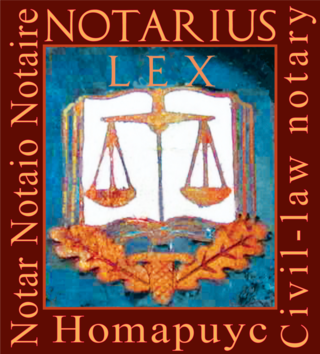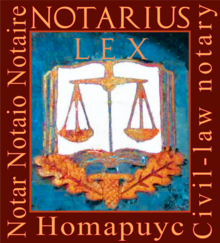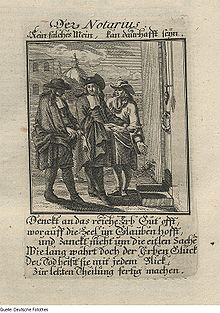
A notary public of the common law is a public officer constituted by law to serve the public in non-contentious matters usually concerned with general financial transactions, estates, deeds, powers-of-attorney, and foreign and international business. A notary's main functions are to validate the signature of a person ; administer oaths and affirmations; take affidavits and statutory declarations, including from witnesses; authenticate the execution of certain classes of documents; take acknowledgments ; provide notice of foreign drafts; provide exemplifications and notarial copies; and, to perform certain other official acts depending on the jurisdiction. Such transactions are known as notarial acts, or more commonly, notarizations. The term notary public only refers to common-law notaries and should not be confused with civil-law notaries.

Civil-law notaries, or Latin notaries, are lawyers of noncontentious private civil law who draft, take, and record legal instruments for private parties, provide legal advice and give attendance in person, and are vested as public officers with the authentication power of the State. As opposed to most notaries public, their common-law counterparts, civil-law notaries are highly trained, licensed practitioners providing a full range of regulated legal services, and whereas they hold a public office, they nonetheless operate usually—but not always—in private practice and are paid on a fee-for-service basis. They often receive generally the same education as attorneys at civil law with further specialized education but without qualifications in advocacy, procedural law, or the law of evidence, somewhat comparable to solicitor training in certain common-law countries.
Legal instrument is a legal term of art that is used for any formally executed written document that can be formally attributed to its author, records and formally expresses a legally enforceable act, process, or contractual duty, obligation, or right, and therefore evidences that act, process, or agreement. Examples include a certificate, deed, bond, contract, will, legislative act, notarial act, court writ or process, or any law passed by a competent legislative body in municipal (domestic) or international law. Many legal instruments were written under seal by affixing a wax or paper seal to the document in evidence of its legal execution and authenticity. However, today many jurisdictions have done away with the requirement of documents being under seal in order to give them legal effect.

The Convention of 5 October 1961 Abolishing the Requirement of Legalisation for Foreign Public Documents, also known as the Apostille Convention, is an international treaty drafted by the Hague Conference on Private International Law (HCCH). The Apostille Convention is intended to simplify the procedure through which a document, issued in one of the contracting states, can be certified for legal purposes in the other contracting states of the Convention. A certification under the Convention is called an apostille or Hague apostille. An apostille is an international certification comparable to a notarisation, and may supplement a local notarisation of the document. If the Convention applies between two states, an apostille issued by the state of origin is sufficient to certify the document, and removes the need for further certification by the destination state.

A promissory note, sometimes referred to as a note payable, is a legal instrument, in which one party promises in writing to pay a determinate sum of money to the other, either at a fixed or determinable future time or on demand of the payee, under specific terms and conditions.

A certified copy is a copy of a primary document that has on it an endorsement or certificate that it is a true copy of the primary document. It does not certify that the primary document is genuine, only that it is a true copy of the primary document.
In American law, a signing agent or courtesy signer is an agent whose function is to obtain a formal signature of an appearer to a document. In common parlance, most jurisdictions require the appearer to sign before a notary public. From this, the practice of a notary public designating themselves as a signing agent has arisen. There are notaries public who specialize in the notarization of real estate transfer and loan document signings. Signing agents often have certification and training through private organizations, but is not a requirement in law, although it may be a requirement of the lender in the oversight of real estate transaction document signatures.
A marriage certificate is an official statement that two people are married. In most jurisdictions, a marriage certificate is issued by a government official only after the civil registration of the marriage.
An eschatocol, or closing protocol, is the final section of a legal or public document, which may include a formulaic sentence of appreciation; the attestation of those responsible for the document, which may be the author, writer, countersigner, principal parties involved, and witnesses to the enactment or the subscription; or both. It also expresses the context of the documentation of the action described therein, i. e., enunciation of the means of validation and indication of who is responsible to document the act; and the final formulae.
A notary public in the Commonwealth of Pennsylvania is an appointed official who acts as an impartial witness and helps defend against fraud.
A notary public in Virginia is authorized to acknowledge signatures, administer oaths, and certify copies On July 1, 2012, Virginia became the first state to authorize a signer to be in a remote location and have a document notarized electronically by an approved Virginia electronic notary using audio-visual conference technology by passing the bills SB 827 and HB 2318.

A legal document assistant in the United States is a person who is a non-lawyer but authorized to assist with the preparation of legal instruments. Unlike a paralegal, legal document assistants do not work under the supervision of an attorney.
An eNotary is a Notary Public who notarizes documents electronically. One of the methods employed by eNotaries is the use of a digital signature and digital notary seal to notarize digital documents and validate with a digital certificate. Also known as remote online notarization (RON), electronic notarization is a process whereby a notary affixes an electronic signature and notary seal using a secure Public key to an electronic document. Once affixed to the electronic document, the document is rendered tamper evident such that unauthorized attempts to alter the document will be evident to relying parties. The e-notary will use cryptography and Public key infrastructure to create, manage, distribute, use, store, and revoke the digital certificate. E-Notary will improve the overall security of the closing process with improved customer file tracking and knowledge-based identification authentication, helping to reduce the frequency of errors or fraud. The Electronic Notary also must keep an electronic register of each act performed.
A certified translation is one which fulfills the requirements in the country in question, enabling it to be used in formal procedures, with the translator accepting responsibility for its accuracy. These requirements vary widely from country to country. While some countries allow only state-appointed translators to produce such translations, others will accept those carried out by any competent bilingual individual. Between these two extremes are countries where a certified translation can be carried out by any professional translator with the correct credentials.
The legal system of Ukraine is based on the framework of civil law, and belongs to the Romano-Germanic legal tradition. The main source of legal information is codified law. Customary law and case law are not as common, though case law is often used in support of the written law, as in many other legal systems. Historically, the Ukrainian legal system is primarily influenced by the French civil code, Roman Law, and traditional Ukrainian customary law. The new civil law books were heavily influenced by the German Bürgerliches Gesetzbuch.
In the U.S. state of Florida, a notary public is a public officer appointed by the governor of the state to take acknowledgments, administer oaths, attest to photocopies of certain documents, solemnize marriage, protest the non-acceptance or non-payment of negotiable instruments, and perform other duties specified by law.
An act is an instrument that records a fact or something that has been said, done, or agreed. Acts generally take the form of legal instruments of writing that have probative value and executory force. They are usually accepted as self-authenticating demonstrative evidence in court proceedings, though with the precarious status of notaries public and their acts under common law, this is not always so.
In the United States, a notary public is a person appointed by a state government, e.g., the governor, lieutenant governor, secretary of state, or in some cases the state legislature, and whose primary role is to serve the public as an impartial witness when important documents are signed. Since the notary is a state officer, a notary's duties may vary widely from state to state and in most cases, a notary is barred from acting outside his or her home state unless they have a commission there as well.
The banker of ancient times was employed within financial activities, during the ancient Mesopotamian, ancient Greek and ancient Roman periods.
A notarial act is any written narration of facts (recitals) drawn up by a notary, notary public or civil-law notary authenticated by the notary's signature and official seal and detailing a procedure which has been transacted by or before the notary in their official capacity. A notarial act is the only lawful means of proving those facts of which it is the recognized record, whereas on other matters it is usually inadmissible, because, being beyond the powers entrusted to the notary by law, it is non-official. In most common-law countries, multiple-page acts are bound together using a sewn or knotted ribbon, the ends of which are secured by a wafer impressed with the notary's seal. This is called annexing or annexure.









